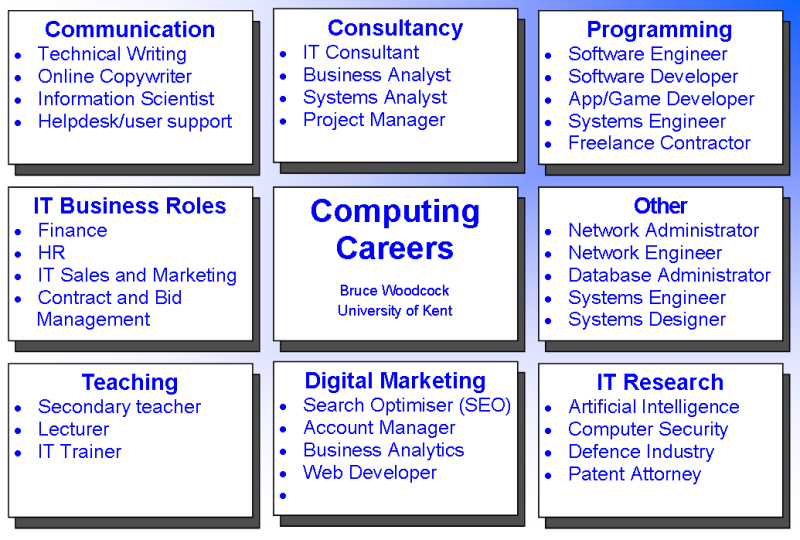Job roles
This is not a problem: there are many one-year “conversion courses” designed to give graduates from any degree subject an intensive grounding in programming and other IT skills. A few of these are listed below. All kinds of first degree disciplines may be combined with these skills to give you an advantage in career areas such as finance, media, library/information work and law.
If you don't want to do a postgraduate course, there are a few employers who will train you on-the-job, although graduates in business, science, maths and engineering may be most in demand here. There are also opportunities within IT companies in non-technical roles such as sales, marketing and customer service.
Now you wear more computing power on your wrist than NASA had available for the whole Apollo project.
Are you suitable for a career in IT?
To test your suitability for a technical role in computing it's a good idea to try some aptitude tests which will give you some idea of whether you might have the aptitude for a career in IT.
You could try teach yourself some Python, Java or JavaScript if you haven't done any programming: it would give you a good idea of your suitability for IT roles and make the first months of an MSc course or IT job much easier.
Python is a modern language which is free and very easy to learn. YouTube was written in Python. You can write your first "Hello World" program in five minutes(!).
Another easy language to learn is JavaScript. A good place to start learning JavaScript is on the w3schools site.
Java is a harder but more powerful language to learn and again, free. The easiest way to start learning Java is via the BlueJ learning environment which you can download for free.
Another good place for beginners is code.org, which has tutorials and exercises covering the basics, to Python, Ruby and Javascript. Codecademy is more advanced and has interactive tutorials for HTML, PHP, Python, Ruby and Javascript.
Also see Computer Science Online for some useful resources

Companies
- Accenture - Accenture accepts people from all degree disciplines and only asks for a genuine interest in IT and its application to business
- CHP Consulting - recruit graduates with a 2:1 or above, in any discipline, and As and Bs at A-Level - or the equivalent
- FDM - take graduates in any degree subject to retrain in computing. Graduate Code Academy
- RDF Group - 12 weeks free coding training before working for client companies. Based in Brighton and recruit year round.
- Hewlett-Packard - no technical experience required
- IBM - For most of our vacancies, any degree discipline is acceptable, because this is a graduate training scheme that can be tailored to your needs
- Makers Academy - learn to code in 12 weeks in London
- Metaswitch Networks - "We are looking for an exceptional academic record, ideally all A grades at A-level or equivalent, and a good degree in any discipline”
- Microsoft - sales, marketing and technical roles
- Sky Graduate Software Engineering Academy Developer Programme - takes degrees in any discipline - you must love all aspects of technology
Find out more
Conversion Courses
There are many courses in IT designed for graduates in other subjects: those listed below are a selection, mostly in the south of England , that may be of interest to Kent graduates. This list does not imply any recommendation of these courses. Other courses can be found by searching the postgraduate database on Prospects.
- University of Kent MSc Computer Science - This course prepares graduates from any discipline for a career in computing, or a career involving the application of computing to their original discipline
- University of Bedfordshire - A range of computing programmes for graduates with various levels of computing knowledge
Teaching There are a number of “subject knowledge booster courses” and conversion courses for graduates interested in teaching a “shortage subject” (including ICT) but who do not have a relevant degree. See our teaching page.
The Bank of England have a number of IT graduate roles where you don’t necessarily have to have done a computer science degree. In fact they find that those that have done music or geography subjects have the right kind of brain/logic to do programming.
Useful websites
- Main Computing Careers page
- BBC: how coding can help you land your dream job
- Prospects IT Sector Briefing
- Target Jobs
- The Alliance of Digital Humanities Organizations - promotes and supports digital research and teaching across all arts and humanities disciplines - their site gives some examples of the areas in which their members are working.





